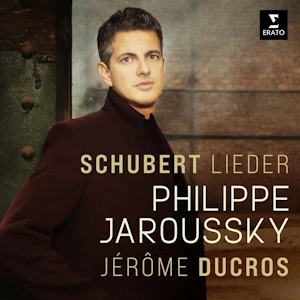
Franz Schubert (1797–1828)
Lieder
Philippe Jaroussky (countertenor)
Jerôme Ducros (piano)
rec. 2020, RiffX Studio 1, Boulogne-Billancourt, Paris
Sung texts with French and English translations enclosed
Reviewed as download
Erato 9029673768 [69]
French countertenor Philippe Jaroussky, now in his mid-forties, started his musical career as a violinist and then took up the piano, before he in the late 1990s began taking singing lessons, and from the beginning of the new millennium he has had an illustrious career as a singer, primarily in baroque repertoire. But his comprehensive discography reveals that he has other strings to his bow as well. In the short foreword to this programme he writes: “Schubert’s music has been with me always, throughout my career as a musician: violinist, pianist and ultimately singer. This album is a declaration of love, for his genius but also for the German language.”
I must at once state that his German is excellent, which I of course knew from before, having heard him singing Bach and Telemann, but in a Lieder programme the language is even more exposed, and he passes the test with kudos. His voice is one of the most beautiful countertenors around, and his technical accomplishments are considerable, so his instrument serves him wonderfully in most situations. This is very obvious in the opening song, Litanei, which also happens to be one of my favourite Schubert songs. His legato is superb, he nuances beautifully, and he is expressive but restrained. The religious mood permeates the reading. It is a wonderful beginning of this programme. The dramatic darkness of Herbst would ideally be sung by a darker voice, but Jaroussky partly compensates this with the intensity of his declamation. This is a recurring problem in the more dramatic songs, and I sometimes would have wished to hear a mezzo-soprano with more dynamic capacity but Jaroussky’s leaner sound also pays dividends, whether it be the beauty of Du bist die Ruh or the light and springy Wiedersehn and even more the elegant and light Die Forelle.
The programme as a whole is a collection of gems. Well, almost all Schubert songs are in fact gems, but here Jaroussky and his excellent pianist Jerôme Ducros have picked very frequently heard and recorded songs, and many collectors probably have favourite recordings by singers from days gone by and also from recent times. In my case Marian Anderson’s dark contralto is forever associated with Ave Maria in the iconic recording from 1936. There is a nobility in her reading that has profoundly touched me since I first heard it on the radio in the early 1950s when I was still a young boy. Jaroussky sings it beautifully and with strong feeling, and if I hadn’t had Anderson’s reading so indelibly etched into my musical memory, I could very well have lived with his version.
Some of the best readings are the three Goethe songs, even though the very fast Der Musensohn at first surprised me – but Nur wer die Sehnsucht kennt and the rather rare Erster Verlust are sensitively and beautifully performed. Throughout, he is very careful with nuances, and his taste is stylish and free from eccentricities. The readings can be regarded as small-scale, and when I am in the right mood I will with pleasure return to this issue, which is excellently engineered and well annotated.
Göran Forsling
Buying this recording via a link below generates revenue for MWI, which helps the site remain free


Contents
1 Litanei auf das Fest aller Seelen D.343 (Johann Georg Jacobi) 5.31
2 Herbst D.945 (Ludwig Rellstab) 3.26
3 Du bist die Ruh D.776 (Friedrich Rückert) 4.23
4 Wiedersehn D.855 (August Wilhelm Schlegel) 3.15
5 Des Fischers Liebesglück D.933 (Karl Gottfried von Leitner) 7.24
6 Die Forelle D.550 (Christian Friedrich Daniel Schubart) 1.59
7 Im Frühling D.882 (Ernst Schulze) 4.16
8 Lied der Mignon (“Nur wer die Sehnsucht kennt”) D.877/4 (Johann Wolfgang von Goethe) 2.59
9 An die Musik D.547 (Franz von Schober) 2.07
10 Die Götter Griechenlands D.677 (Friedrich Schiller) 3.52
11 Der Musensohn D.764 (Johann Wolfgang von Goethe) 1.57
12 Erster Verlust D.226 (Johann Wolfgang von Goethe) 1.53
13 Im Abendrot D.799 (Karl Lappe) 3.20
14 An Silvia D.891 (William Shakespeare; transl. Eduard von Bauernfeld) 2.37
15 Nacht und Träume D.827 (Matthäus Casimir von Collin) 3.39
16 Die Sterne D.939 (Karl Gottfried von Leitner) 3.03
17 Abendstern D.806 (Johann Mayrhofer) 2.15
18 Ellens dritter Gesang (Ave Maria): Hymne an die Jungfrau D.839 (Walter Scott; transl. Adam Storck) 4.41
19 Nachtstück D.672 (Johann Mayrhofer) 5.19

















